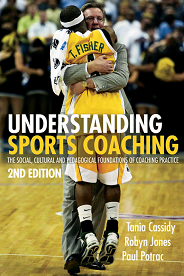Understanding sports coaching

Introduction 55
What is a coaching philosophy? And why does a coach need to develop one? 57
Problematizing coaching philosophies 58
Developing functional, flexible philosophies 61
Concluding thoughts 64
Suggested readings 64
End-of-chapter tasks 64
PART TWO: THE ATHLETES 65
Chapter 5
Learning and development 67
Introduction 67
Behaviourist orientations to learning 68
Cognitive orientations to learning 73
Cognitive orientations to development 77
Concluding thoughts 82
Suggested readings 83
End-of-chapter tasks 83
Chapter 6
‘Developing’ athletes 85
Introduction 85
Developmentalism – what is it? 85
What does development do? 87
Doing development differently 90
Concluding thoughts 91 What is identity? 94 Suggested readings 92 End-of-chapter tasks 92 Chapter 7 Understanding athletes’ identities 93 Introduction 93
Disability and identity 96
Gendered identity 99
Sexualized identity 104
Ethnic and religious identity 107
Two case studies: Anne and Hussain 108
Concluding thoughts 111
Suggested readings 112
End-of-chapter tasks 112
PART THREE: COACHING CONTENT 113
Chapter 8
The discourses of coaching 115
Introduction 115
What is discourse? 116
Why study discourse in the coaching context? 117
The dominant discourse of ‘coaching science’: Performance, rationality and a hierarchical coach–athlete relationship 118
The effect on athletes of a power-dominated discourse 120
An alternative coaching discourse 123
Concluding thoughts 124
Suggested readings 125
End-of-chapter tasks 125
Chapter 9
Examining coaches’ content knowledge 126
Introduction 126
Content knowledge 127
Vignette: Utilizing content knowledge 129
Limitations of the framework 130
(Re) thinking coaches’ knowledge 133
Concluding thoughts 134
Suggested readings 134
End-of-chapter tasks 134
Chapter 10
Assessment and ability in coaching 135
Introduction 135
Assessment for educational purposes 137
Assessment and ability 141
Vignette: Coaching the professionals 141
Reconceptualizing ability 142
Concluding thoughts 145
Suggested readings 145
End-of-chapter tasks 146
PART FOUR: COACHING CONTEXT 147
Chapter 11
Coaching ethics 149
Introduction 149
Ethical codes and ethical issues in coaching 151
Problematizing ethics: Moving towards virtues-based conduct 153
Personalizing coaches’ ethical behavior 157
Concluding thoughts 160
Suggested readings 160
End-of-chapter tasks 160
Chapter 12
Theory, practice and professionalism in coaching 161
Introduction 161
Theory, practice and professionalism 162
Coach education and the development of professionalism in coaching practice 165
Concluding thoughts 173
Suggested readings 173
End-of-chapter tasks 174
Chapter 13
Power and the coach–athlete relationship 175
Introduction 175
Power and the coach–athlete relationship 176
Concluding thoughts 191
Suggested readings 191
End-of-chapter tasks 192
Bibliography 193
Index 214
0 comentarios